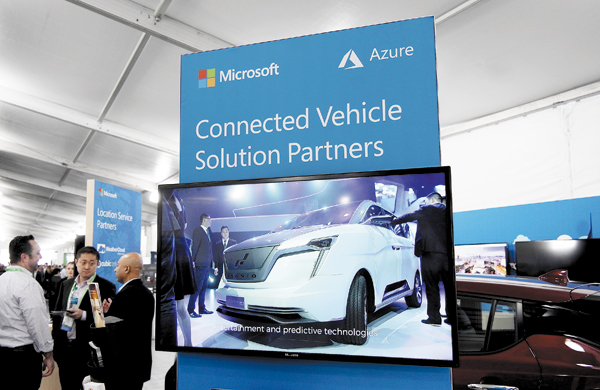Artificial intelligence to decide future of mobility
By Hao Yan | China Daily | Updated: 2017-12-18 09:54

China is leading the charge into the autonomous driving era, thanks to high-tech
Technological breakthroughs in artificial intelligence, specifically autonomous driving, are expected to fuel the world's largest auto market in the next decade.
The Chinese Association for Artificial Intelligence and German firm Roland Berger Strategy Consultants, have released a joint report, China's Artificial Intelligence Innovation and Application, which examines the development of artificial intelligence and estimates its value for commercial applications in the automotive industry.
The industry will adopt AI in many ways, including in autonomous driving assistance systems, marketing, product optimization, sales volume estimates, and predicting repairs, according to the joint report.
"China's automotive industry has been the global leader, especially in setting the latest trends and advancing cutting-edge technologies," said Johan Karlberg, a Shanghai-based partner at Roland Berger Greater China.
The report predicted that technological breakthroughs made by AI in automated driving will bring about 500 billion yuan ($75.7 billion) of added value in China by 2030, and that the automotive sector will be among the most heavily influenced of the traditional industries.
Fu Yuwu, head of the Society of Automotive Engineers of China, said: "No other governments are giving as strong and powerful support to the development of intelligent connected vehicles as the Chinese government."
"A strong automotive industry is a vehicle for innovation, and I think we have found the path to achieve core technological breakthroughs," Fu made the comments at the Innovation Leader of Automotive and Mobility in Beijing.
Roland Berger said that, in the long run, AI technology will make personalized services available for more consumers and businesses, and it will be applied to more common scenarios without increasing marginal costs.
"The interesting part is users' in-vehicle consumption, with future business opportunities attracting many companies. It has attracted technology companies such as Google and Baidu, who want a share in it," said Karlberg.
Consumer behavior will change, since users will not be driving cars, but enjoying their leisure time instead, he said.
Some international giants are rushing to apply artificial intelligence to transportation in the Chinese market.
In November, Microsoft announced a partnership with Chinese-controlled Iconiq Motors to develop smart vehicles that "will define the future of mobility".
Their joint news release said Microsoft's Connected Vehicle Platform will be integrated into Iconiq Motors' first electric model, the Iconiq Seven. The product will be one of the first to deploy end-to-end connected electric vehicle mobility solutions based on Microsoft's intelligent cloud technologies in China.
The vehicle's AI personal assistant can perform both personal and work-related tasks for passengers, such as booking their next vacation and scheduling meetings, while keeping passengers connected to the world in real time.
The CAAI and Roland Berger report said that Chinese AI companies are developing well and are playing a leading role globally amid the latest industry developments, benefiting from the most mature foundation for growth and the largest potential for market adoption.
Chinese technology companies such as Baidu and Tencent are already involved in developing electric cars, providing supporting map services and automated driving systems.
Both of the companies are investing in Nio and Weltmeister Motor, which are set to launch mass-produced electric SUV models claimed to be capable of highly autonomous driving.
Zhejiang province-headquartered Hakim Unique Group, which is working on smart city and high-tech zone projects, has joined hands this month with United States electric vehicle design and production company, Fisker.
The partnership covers the Fisker Orbit electric autonomous shuttle and other future projects in China. Hakim Unique will provide the infrastructure, communications and localization services, according to the news release.
The companies said they expect the 10-seater Fisker vehicle-set to enter operation by the end of 2018-to be capable of fully autonomous driving on preset road paths within smart city areas or high-tech zones, with automated functionality for passengers hopping on and off.
Since AI has huge potential commercial application value, Roland Berger said it recommends that Chinese enterprises who want to seize strategic opportunities start collecting data as soon as possible.
"Without completely understanding their customers and building a direct relationship with them, a company will become a simple equipment manufacturer," Karlberg said.
The Chinese automotive industry has solid data infrastructure and ample data resources, but automakers must make their business model apply to the current situation, he said, adding that Chinese companies have already pinned great importance on the data set to be generated in the future.
Companies need to study the development of external markets, understand their competitors' strategies, assess the opportunities for employing AI in their own businesses, and they need to learn, observe and experiment with business application cases in various parts of the value chain, Karlberg said.
Jack Wong of Hakim Unique Group said: "The greatest opportunity for society in the future comes from the orchestra of data, intelligence and collaboration-as well as the convergence of online and offline activities."
























